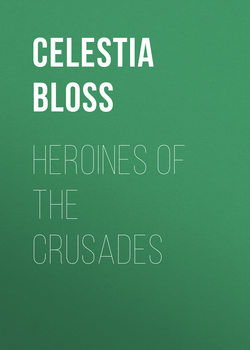Читать книгу Heroines of the Crusades - Celestia Angenette Bloss - Страница 3
ADELA
CHAPTER II
Оглавление“But doth the exile’s heart serenely dwell in sunshine there?”
A succession of brilliant pageants, and knightly entertainments awaited the Conqueror, his nobles and hostages, in their pompous progress through all the towns and cities of Normandy, from Feschamp to Bayeux.
Robert already wearing the spurs of knighthood, girt with silver baldric, and bearing high the lance with its pointed banderol, led the van; gallantly conducting the young Earls Morcar and Edwin, and the royal Atheling: while the aspiring Prince William, attaching himself to a band of his father’s best trained bowmen, practised on bright winged birds, those feats of archery in which he subsequently became so cruelly skilful.
Adela obtained a place near the gentle Maude, and strove by every childish art to charm back the smiles that transiently enlivened the sad countenance of the Saxon maiden. Not less assiduously, and not more successfully did the Duke King, and his haughty consort, employ the fascinations of easy grace, and polished wit, to beguile the gloomy musings of the captive Waltheof. So passed they on, the sad hearts with the gay. So sat they in the halls of mirth, the one keeping strict lenten fast, the other revelling in triumphal feasts; one sole thought embittering the fast, and sweetening the feast – and that thought England.
In a chamber in the palace of Bayeux were assembled the household of the Conqueror, busy in their daily occupations. Groups of girls, with nimble fingers, wrought silently under the eye of Matilda, the sad epic of England’s fall.
“Leave thy tangled skeins to these fair maids, and the skilful Turold, and come thou apart with me,” said William, abruptly entering and drawing his Queen aside, within the deep embrasure of the window, “’tis of thy glory and mine that I would speak.”
The conference lasted long. The young princes summoned the maidens to the mimic tourney in the tiltyard, and waiting clouds prepared the gorgeous couch of sun, beyond the hills of Bretagne, ere the wily statesman had completed the unfoldings of all his schemes, for fixing the Norman line securely upon the throne of Edward the Confessor. He revealed his apprehensions from the stern character of Waltheof, and his hopes from the fascinations of his niece Judith d’Aumale. From Edgar Atheling he feared little. The boy reared in a foreign court, a stranger to Saxon language and manners, had neither desire nor capacity to contend for a dignity unsuited to his years. He was already hand and glove with Robert, and subject to the imperious will of the young knight.
But Morcar and Edwin were more dangerous foes. Kinsmen of the late king, at the least disaffection they might rouse the friends of the famous Earl Siward, vanquisher of Macbeth; the thegns of Norfolk, Ely, Huntingdon, and Northumbria, stretching far to the Scottish border; and the valiant man of Mercia allied to the terrible Welsh.
“The victory at Hastings, my Queen,” said William, with his blandest smile, “does not establish peaceful rule o’er all the hills and vales of merrie England. Let policy complete what valor has commenced. Methinks our pretty Cicely might bind the restive Edwin in the silken toils of love, more securely than unwilling homage or extorted oath.”
“Cicely, the betrothed of Harold!” exclaimed Matilda. “Could’st thou have seen her agony when tidings of Harold’s death came with news of thy victory, thou would’st scarcely speak to her of love.” “A childish fancy,” impatiently cried William, “the breath of praise soon dries the tears on a maiden’s cheeks. She must be the Saxon’s bride.”
“It is impossible,” replied the Queen. “In Notre-Dame de Bonnes Nouvelles, while my soul was filled with joy for thy safety, did I dedicate thy broken-hearted child to be the bride of Heaven. The holy Lanfranc has already sanctioned the vow.”
William strode hastily up and down the chamber, tying and untying the rich cordon of his cloak in uncontrollable anger and disappointment.
Matilda laid her hand soothingly upon his arm. “Agatha is fairer than Cicely – Adela hath wit beyond her years, and child as she is, will readily comprehend all thy schemes.”
“Talk not of Adela, she hath a head for intrigue equal to my brother Odo. Wed her to one who might foster her ambition, and neither crown nor throne would be beyond her aspirations.”
“Agatha hath a loving heart,” pleaded Matilda.
“Thou sayest truth Bein Aimie, ’tis by the heart woman rules. Agatha shall be the affianced of Edwin before he leaves these shores.”
Thus it was settled. The new Queen received the title of the manor of Gloucester, and condemned the owner, her former lover, to perpetual imprisonment. The fair Maude was to dwell in exile a hostage for the fidelity of her father, till a fitting opportunity might occur to make her hand the bond of amity between the Conqueror and some disaffected peer. Other hostages with their various possessions were disposed of in a similar manner, and thus the shades of evening stole into that darkened chamber, and brooded like palpable forms over the sacrifices which the new sovereigns covertly laid upon the altar of Avarice and Ambition.
The ceremony of betrothal took place on the following evening. There were guests in embroidered garments and costly jewels, there were lights and music, and more than wonted festivity: yet Maude saw only Edwin, and when taking the hand of the little princess, he pronounced with unhesitating voice, “Thine, and thine only,” the color faded from her lip and cheek, as if a mortal woe had fastened on her heart.
There were gifts and congratulations, and as Edwin presented his bride a miniature shield of silver, saying gallantly, “This shall thy heart from other love defend,” a gleam of triumph on the countenance of William assured Matilda that Edwin was won.
